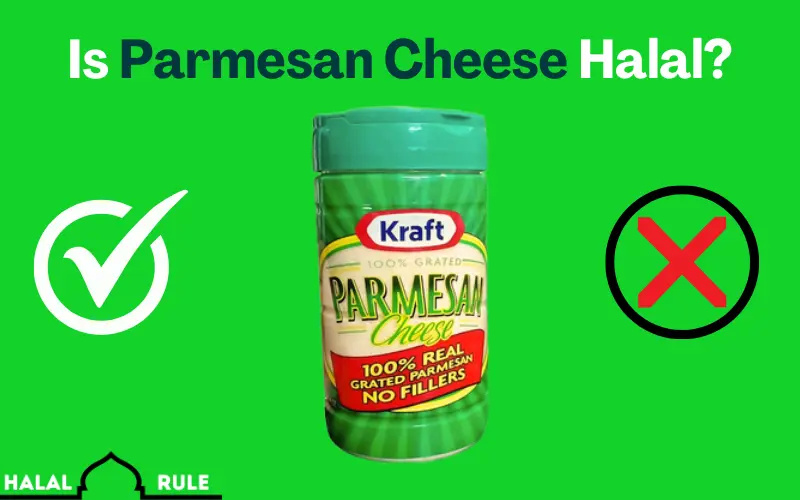Is Parmesan Cheese Halal Or Haram In Islam?
The question of whether parmesan cheese is halal or haram in Islam has been a topic of debate for many years.
With the rise in popularity of Italian cuisine, parmesan cheese has become a staple in many households, but its true status in Islamic dietary laws remains unclear.
In countries like the USA, UK, and Canada where Muslims form a significant part of the population, this question is particularly relevant.
In this blog post, we’ll clear the doubt and answer is parmesan cheese halal or haram in Islam with proper explanation and references. So let’s clear the doubt.

Is Parmesan Cheese Halal?
No, parmesan cheese is not halal according to Islamic dietary laws. Parmesan cheese contains animal rennet which is an enzyme derived from the stomach of young calves, lambs, or goats.
As per Islamic dietary laws, Muslims are only allowed to consume meat and dairy products from animals that have been slaughtered by halal guidelines.
These guidelines include reciting the name of Allah (God) while slaughtering the animal, making sure it is facing towards Qibla (direction of Mecca), and severing the jugular vein, carotid artery, and windpipe to ensure quick and painless death.
Since animal rennet is derived from animals that have not been slaughtered in accordance with halal guidelines, it is considered haram (forbidden) for consumption.
Most of the Parmesan cheese brands available in the market like Kraft, Polly-O, Great Value, and Sargento use animal rennet as an ingredient to produce their products.
However, with time if a new brand arises that has halal certification and no rennet is used as an ingredient, then it will be considered as halal.
However, till now, parmesan cheese is not halal as we don’t find any Parmesan cheese with halal certification. Every brand has listed rennet in their ingredients.
Also note that this applies to all countries including the USA, UK, and Canada where the use of animal rennet is common in parmesan cheese production.
You can also learn is cheddar cheese halal.
What About Vegetarian Parmesan Cheese?
Some companies claim to produce vegetarian parmesan cheese which doesn’t contain animal rennet but uses microbial rennet (produced by fermenting a fungus) instead.
In this case, it may be permissible for Muslims to consume the cheese, but it is always best to check for halal certification from a reputable Islamic organization before consuming.
If you don’t have access to halal certification, it is recommended to avoid consuming such products as a precaution.
In the case of Parmesan, the chances of having rennet as an ingredient are high, and if it’s not listed then it means the company is keeping their secret recipe confidential.
This is because the rennet is an essential ingredient in the production of parmesan cheese and without it, the flavor and texture of the cheese would be different.
Moreover, in many cases, companies may change their production methods or ingredients without notifying consumers, making it important to always check for halal certification.
Also see is Philadelphia cream cheese halal.
How Is Parmesan Cheese Made?
Parmesan cheese, also known as Parmigiano Reggiano in Italy, is made from cow’s milk. The milk is heated and mixed with rennet to coagulate the proteins.
Once the curds are formed, they are cut into small pieces and cooked at specific temperatures to remove excess moisture.
The curds are then placed in molds and pressed to form the characteristic wheel shape of parmesan cheese.
After being pressed, the cheeses are soaked in brine for a few weeks to develop their flavor. They are then aged for at least 12 months before being sold.
The traditional method of making parmesan cheese is quite complex and requires strict adherence to specific guidelines, which is why it is often considered one of the best quality cheeses in the world.
The Whey and Rennet are added while the heat is on which helps coagulate the milk. Later it is cut to form curds and persistently heated until the whey disappears.
The remaining curd is then placed in molds, sometimes with additional salt or herbs, before being pressed into large wheels that can weigh up to 88 pounds.
After pressing, the cheese is aged for at least one year and often up to three years, which gives it the distinctive nutty and slightly salty flavor that is characteristic of parmesan cheese.
Ingredients Used In Parmesan Cheese
Apart from milk and rennet, parmesan cheese also contains salt and starter cultures.
Starter cultures are bacteria that are added to the milk to help it ferment and add flavor to the cheese.
Salt is used for preserving and flavoring the cheese during the aging process.
In some cases, companies may add enzymes or additives such as cellulose (a plant fiber) to prevent clumping of the cheese.
However, these ingredients do not affect the halal status of parmesan cheese, as long as animal rennet is not used in the production process.
If you’re confused about Ricotta cheese, you must learn is Ricotta cheese halal.
Parmesan Cheese Uses
Parmesan cheese is a versatile ingredient and is used in many Italian dishes such as pasta, pizza, Sandwiches, salads, Meat dishes, and soups.
It can also be used as a topping for popcorn or added to sauces for extra flavor.
Due to its strong nutty and salty flavor, parmesan cheese is often grated or shaved over food just before serving.
Some people may also consume it on their own or paired with fruits and nuts as a snack.
FAQs
Q. Is parmesan cheese halal hanafi?
A. According to the Hanafi school of thought, Parmesan cheese is not halal due to the use of animal rennet.
Q. Is kraft parmesan cheese halal?
A. No, Kraft parmesan cheese is not halal as they use animal rennet in their production process.
Q. Which parmesan cheese is halal?
A. Miller’s Parmesan cheese might be halal as they claim to use microbial rennet in their production process, but they don’t have halal certification so better to avoid it.
Q. How to check if parmesan cheese is halal?
A. To check if a specific brand of Parmesan cheese is halal, look for halal certification from a reputable Islamic organization and ingredients list that does not include animal rennet.
Conclusion
In conclusion, parmesan cheese is not considered halal for consumption due to the use of animal rennet in its production process.
While some companies may produce vegetarian versions of parmesan cheese, it is still important to check for halal certification before consuming.
For Muslims, there are many alternatives available that are halal certified and can be used as substitutes for parmesan cheese in recipes.
It is always important to stay informed and make conscious choices when it comes to consuming food, and halal certification is one way to ensure that the food we eat is permissible according to Islamic guidelines.
I hope your query is Parmesan cheese halal or not is now answered and you can make informed decisions about your food choices.






